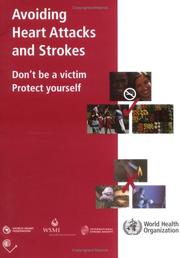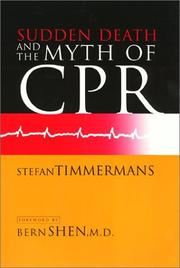
ISBN: 9241546727 9786610268696 1423747577 1280268697 9240684476 9240680101 Year: 2005 Publisher: Geneva : World Health Organization,
Abstract | Keywords | Export | Availability | Bookmark
 Loading...
Loading...Choose an application
- Reference Manager
- EndNote
- RefWorks (Direct export to RefWorks)
This booklet explains why heart attacks and strokes happen and how you can avoid them. It tells you what you should do to avoid becoming a victim. It gives you guidance for your children too. A lot of the damage to the blood vessels starts at a young age. Children often need help to develop healthy habits, like eating a balanced diet and being active. If you are at high risk, there is advice on the signs to look out for and what you can do to reduce your risk. If you have already had a heart attack or stroke, there is advice on how your condition can be treated and controlled, and how you can
Arrest [Cardiac ] --- Arrêt cardiaque --- Arrêt du coeur --- Cardiac arrest --- Cardiopulmonary arrest --- Coeur [Arrêt du ] --- Hartstilstand --- Heart arrest --- Sudden cardiac death --- Cardiovascular Diseases. --- Cerebrovascular disease. --- Lifestyle. --- Myocardial infarction. --- Prevention and Control. --- Risk Factors. --- Therapy. --- Myocardial infarction --- Cerebrovascular disease --- Prevention.
Periodical
ISSN: 19618654 Year: 1998 Publisher: Le Bouscat, France : L'esprit du temps,
Abstract | Keywords | Export | Availability | Bookmark
 Loading...
Loading...Choose an application
- Reference Manager
- EndNote
- RefWorks (Direct export to RefWorks)
Death --- Mort --- Cardiac Death --- Determination of Death --- Near-Death Experience --- Death, Cardiac --- Thanatology --- Fatal Outcome --- Dying --- End of life --- Life --- Terminal care --- Terminally ill --- Philosophy --- End Of Life --- End-Of-Life --- Death. --- Mort. --- deaths.

ISBN: 1566397162 1566397154 Year: 1999 Publisher: Philadelphia Temple university press
Abstract | Keywords | Export | Availability | Bookmark
 Loading...
Loading...Choose an application
- Reference Manager
- EndNote
- RefWorks (Direct export to RefWorks)
CPR (First aid) --- Cardiac arrest --- Emergency medical services --- Social medicine --- Sudden death --- Social aspects --- Treatment --- Death --- Mortality --- Cardiopulmonary resuscitation --- Resuscitation, Cardiopulmonary --- Resuscitation --- Cardiac resuscitation --- Arrest, Cardiac --- Cardiopulmonary arrest --- Heart arrest --- Sudden cardiac death --- Heart --- Heart failure --- Causes --- Diseases
Book
ISBN: 1280492465 9786613587695 0813549086 9780813549088 9780813546278 0813546273 9780813546285 0813546281 9781280492464 6613587699 Year: 2010 Publisher: New Brunswick, N.J. Rutgers University Press
Abstract | Keywords | Export | Availability | Bookmark
 Loading...
Loading...Choose an application
- Reference Manager
- EndNote
- RefWorks (Direct export to RefWorks)
Today most people die gradually, from incremental illnesses, rather than from the heart attacks or fast-moving diseases that killed earlier generations. Given this new reality, the essays in Final Acts explore how we can make informed and caring end-of-life choices for ourselves and for those we loveùand what can happen without such planning. Contributors include patients, caretakers, physicians, journalists, lawyers, social workers, educators, hospital administrators, academics, psychologists, and a poet, and among them are ethicists, religious believers, and nonbelievers. Some write moving, personal accounts of "good" or 'bad" deaths; others examine the ethical, social, and political implications of slow dying. Essays consider death from natural causes, suicide, and aid-in-dying (assisted suicide). Writing in a style free of technical jargon, the contributors discuss documents that should be prepared (health proxy, do-not-resuscitate order, living will, power of attorney); decision-making (over medical interventions, life support, hospice and palliative care, aid-in-dying, treatment location, speaking for those who can no longer express their will); and the roles played by religion, custom, family, friends, caretakers, money, the medical establishment, and the government. For those who yearn for some measure of control over death, the essayists in Final Acts, from very different backgrounds and with different personal and professional experiences around death and dying, offer insight and hope.
Thanatology. --- Death. --- Death --- Dying --- End of life --- Life --- Terminal care --- Terminally ill --- Thanatology --- Cardiac Death --- Determination of Death --- End Of Life --- End-Of-Life --- Near-Death Experience --- Death, Cardiac --- Fatal Outcome --- Philosophy
Book
ISBN: 9780892369478 0892369477 Year: 2009 Publisher: Los Angeles J. Paul Getty Museum
Abstract | Keywords | Export | Availability | Bookmark
 Loading...
Loading...Choose an application
- Reference Manager
- EndNote
- RefWorks (Direct export to RefWorks)
"This book will examine the iconography of death as well as that of its symbolic opposite - resurrection and rebirth."--Introduction.
iconography --- dood --- iconografie --- thema's in de kunst --- Iconography --- theme --- Thematology --- Death in art --- Resurrection in art --- Death --- Attitude to Death --- Medicine in the Arts --- Attitudes to Death --- Death, Attitude to --- Death, Attitudes to --- Medicine in Art --- Medicine in Arts --- Art --- Cardiac Death --- Determination of Death --- Near-Death Experience --- Death, Cardiac --- Thanatology --- Fatal Outcome --- End Of Life --- End-Of-Life
Book
ISBN: 0333484401 Year: 1989 Publisher: Basingstoke : Macmillan,
Abstract | Keywords | Export | Availability | Bookmark
 Loading...
Loading...Choose an application
- Reference Manager
- EndNote
- RefWorks (Direct export to RefWorks)
History of human medicine --- Death. --- Health. --- Disease. --- History of Medicine. --- Medicine, History --- Medicine --- Diseases --- Normalcy --- Normality --- Normalities --- Cardiac Death --- Determination of Death --- Near-Death Experience --- Death, Cardiac --- Thanatology --- Fatal Outcome --- history --- Death --- DISEASE --- Health --- history. --- Disease --- History. --- History Medicines --- Medicine Histories --- Medicines, History --- End Of Life --- End-Of-Life --- History of Medicine
Book
ISBN: 0709916906 9780709916901 Year: 1985 Publisher: London Croom Helm
Abstract | Keywords | Export | Availability | Bookmark
 Loading...
Loading...Choose an application
- Reference Manager
- EndNote
- RefWorks (Direct export to RefWorks)
Death --- Mort --- Moral and ethical aspects --- Aspect moral --- Brain Death. --- Death. --- Ethics, Medical. --- Medical Ethics --- Medicine --- Professionalism --- Bioethics --- Cardiac Death --- Determination of Death --- Near-Death Experience --- Death, Cardiac --- Thanatology --- Fatal Outcome --- Irreversible Coma --- Brain Dead --- Coma Depasse --- Brain Deads --- Coma, Irreversible --- Death, Brain --- ethics --- Brain death --- Ethics --- medical --- Brain death. --- medical. --- Medical ethics --- Brain Death --- Ethics, Medical --- Medical. --- End Of Life --- End-Of-Life
Book

ISBN: 2204026689 9782204026680 Year: 1986 Publisher: Paris: Les Édition du Cerf,
Abstract | Keywords | Export | Availability | Bookmark
 Loading...
Loading...Choose an application
- Reference Manager
- EndNote
- RefWorks (Direct export to RefWorks)
Euthanasia --- DEATH --- ATTITUDE TO DEATH --- Attitude to Death. --- Death. --- Euthanasia. --- #gsdb5 --- Euthanasia, Involuntary --- Involuntary Euthanasia --- Mercy Killing --- Killing, Mercy --- Killings, Mercy --- Mercy Killings --- Right to Die --- Suicide, Assisted --- Bioethical Issues --- Cardiac Death --- Determination of Death --- Near-Death Experience --- Death, Cardiac --- Thanatology --- Fatal Outcome --- Attitudes to Death --- Death, Attitude to --- Death, Attitudes to --- Death --- End Of Life --- End-Of-Life --- Attitude to Death --- gsdb5.
Book
ISBN: 3319249916 3319249932 Year: 2016 Publisher: Cham : Springer International Publishing : Imprint: Springer,
Abstract | Keywords | Export | Availability | Bookmark
 Loading...
Loading...Choose an application
- Reference Manager
- EndNote
- RefWorks (Direct export to RefWorks)
This book describes the most recent insights into heart failure and the role played by autonomic nervous system pathophysiology in it, discussing the therapeutic implications. While current therapeutic approaches are able to control the effects of excessive adrenergic activation in heart failure syndrome, the underlying abnormalities of adrenergic control remain unaltered and can still cause progression to unmanageable end-stage heart failure. New therapeutic pathways are therefore being explored with a view to developing interventions that can directly modulate adrenergic over-activity and restore a more appropriate balance in neural control of the cardiovascular system. The book opens by examining current heart failure therapies. Advances in our understanding of autonomic regulation/dysregulation in heart failure are then discussed in detail, in the context of the search for more effective therapies. A concluding section addresses the role of autonomic nervous system denervation in heart failure. The authors are top scientists from leading research centers.
Cardiovascular Diseases --- Medicine --- Health & Biological Sciences --- Heart failure. --- Cardiac arrest. --- Arrest, Cardiac --- Cardiopulmonary arrest --- Heart arrest --- Sudden cardiac death --- Cardiac failure --- Cardiac insufficiency --- Failure, Heart --- Insufficiency, Cardiac --- Heart --- Heart failure --- Cardiac arrest --- Diseases --- Cardiology. --- Neurology. --- Nephrology. --- Angiography. --- Cardiac Surgery. --- Angiology. --- Surgery. --- Blood-vessels --- Diagnosis, Radioscopic --- Radiography, Medical --- Cardiac surgery --- Open-heart surgery --- Internal medicine --- Kidneys --- Nervous system --- Neuropsychiatry --- Radiography --- Surgery --- Neurology . --- Cardiac surgery.
Book
ISBN: 9782889192694 Year: 2014 Publisher: Frontiers Media SA
Abstract | Keywords | Export | Availability | Bookmark
 Loading...
Loading...Choose an application
- Reference Manager
- EndNote
- RefWorks (Direct export to RefWorks)
With upwards of 4.5 million deaths worldwide each year, and more than one tenth of these occurring in those with no previously documented heart disease, sudden arrhythmic death (SAD) is both a major public health burden and a highly emotive issue for society at large. Recent years have witnessed a marked expansion in our knowledge of the physiology underlying SAD, both in the context of hereditary and acquired cardiac disorders. Thanks largely to work in genetically modified animals, the growth in our understanding of mechanisms underlying arrhythmia in the hereditary channelopathies has been particularly marked. Our growing knowledge of the fundamental mechanisms underlying SAD has so far failed to spur substantial developments in clinical practice. Despite a large body of work in both humans and animals, it remains impossible to confidently identify those at high risk of SAD, making pre-emptive therapy a challenge. What is more, with the thankful exception of the implantable cardioverter-defibrillators and pharmacological agents in very specific situations, there has been depressingly little progress in finding new and effective therapies. This Research Topic aims to go some way towards bridging the gap between advances in basic science and the development and delivery of new therapies. It brings together original research contributions and review articles from key opinion leaders in the field, focusing on the direct clinical implications of the basic science research now and in the future.
Sudden death. --- Sudden death --- Cardiac arrest --- Prevention. --- Pathophysiology. --- Death --- Mortality --- Causes --- Arrest, Cardiac --- Cardiopulmonary arrest --- Heart arrest --- Sudden cardiac death --- Heart --- Heart failure --- Diseases --- ventricular arrhythmia --- Inherited arrhythmia syndromes --- sudden death --- arrhythmia mechanisms --- Channelopathies --- ventricular tachycardia --- cardiac modelling --- Ventricular Fibrillation --- Atrial Fibrillation --- Brugada Syndrome

 Search
Search Feedback
Feedback About
About Help
Help News
News